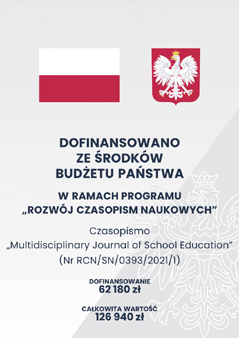Changing Lives, Changing Languages: Societal Impact on Language Teaching
Abstract
1989 was a dividing line in the history of Central & Eastern European countries. Not only political systems were re-organized, but also social and cultural relations had to be revisited. It is valid to education as well because it welcomed new structures, subjects and philosophies, very often in new educational environments. In Hungary, language education was in a special situation: due to the changing social demands it had to face new challenges with the introduction of foreign languages not widely taught up to this time. The three pillars of the study are the analysis of the shift from a socialist regime into capitalism and its reflection in language education, the description of the appearance of different languages in public and higher education, and the introduction of new methods and synergies applied in the new era of FLT (foreign language teaching). Illustrations of present results are provided from the two far ends of education, namely, pre-school education and kindergarten teacher-training.Key words: change, educational challenges, foreign language teaching (FLT), good practices, teacher-training
References
Andrews, M., Kitzinger, A., Pohl, U., Simon, P., Tóth I., Végh, G. (2001 b). Zoom In - on Britain and Hungary. Teacher's Book, London: Swan Communication.
Emelyanenko, V. (2009). "Russian is in demand around the world once again" - Interview with Yuri Prokhorov. Russkiy Mir Foundation. para. 9. Retrieved October 23, 2016, from http://russkiymir.ru/en/magazines/article/144505/
Keresztes, Cs. (2013). Diákkövetelés az orosz nyelv kötelező tanulása ellen, Magyar Nemzeti Levéltár, para. 2. Retrieved October 23, 2016, from
http://mnl.gov.hu/a_het_dokumentum/diakkoveteles_az_orosz_nyelv_kotelezo_tanulasa_ellen.html
Kitzinger, A. (2002). Pages of a Storybook: an Account of a British - Hungarian Project of Cultural Studies. In McRae, J. (Ed.), Reading Beyond Text: Processes and Skills (pp. 325-344.). Seville: CAUCE.
Kitzinger, A. (2010). Korai nyelvfejlesztés Európában és Magyarországon. Képzés és gyakorlat, 1. szám, pp. 91-98.
Kitzinger, A. (2014). Multilingual-multicultural challenges in the kindergarten. Abstract Early Language Learning: Theory and Practice in 2014, 46-47.
Kivonulnak a szovjet csapatok. (1990). Hír24. Retrieved October 23, 2016, from http://galeria.hir24.hu/3/44093/Kivonulnak_a_Szovjet_csapatok?fb_comment_id=436864639712540_4011400#kep-341849
Kovács, J., Trentinné Benkő, É.(2014). The World at Their Feet. Budapest: Eötvös József Könyvkiadó.
Laki, M. (2006). Az idegennyelv-oktatási piac átalakulása 1989 után. Közgazdasági Szemle, LIII, pp. 880-901.
Malderez, A., Medgyes, P., (Eds.). (1996). Changing perspectives in teacher education. Oxford: Heinemann.
National Institute of Public Education (OKI). (2001). Report: Education in Hungary 2000 [Report]. Forgács, A.: Author.
Promoting language learning and linguistic diversity. (2004). An action plan 2004-06, European Communities, Luxemburg.
Statistical Office of the European Communities. (2013). EUROSTAT: Two-thirds of working age adults in the EU28 in 2011 state they know a foreign language. Luxembourg: Eurostat.
Copyright (c) 2017 Arianna Kitzinger

This work is licensed under a Creative Commons Attribution-NoDerivatives 4.0 International License.
- The Author/Authors agree(s) to publish the article free of charge in Multidisciplinary Journal of School Education in English or Spanish. The Editorial Board reserves the right to shorten the texts and change the titles.
- As part of free publication mentioned in § 1, the Author/Authors agrees to make the full electronic version of their article available in the Internet.
- The Author/Authors agrees to index their article in databases at home and abroad, including abstracts and keywords as well as Author's/Authors’ affiliation in English and in other languages. The Author/Authors agrees to pass on the information mentioned above to the owners of these databases.
- The Author/Authors declares that their publication is original and does not include borrowings from other works which might cause Publisher's responsibility, does not infringe the rights of the third party and that their copyright on this publication is not limited. The Author/Authors will incur all the costs and will pay compensations which might result from the mendacity of the following statement.
- The Author/Authors declares to bear complete responsibility for the scientific reliability of the article submitted. The detailed contribution of all co-authors is defined.
- The Author/Authors declares to publish the text in the Multidisciplinary Journal of School Education under a Creative Commons Attribution-NoDerivatives 4.0 International License (CC BY-ND 4.0).
- For more than one author, please complete the Authorship Contributions and send it to the editorial office. Please indicate the specific contributions made by each author (list the authors’ initials, e.g., JKH). Please download, complete, scan and attach the file in the system during the submission process.
Authors Statement - Authorship Contributions






